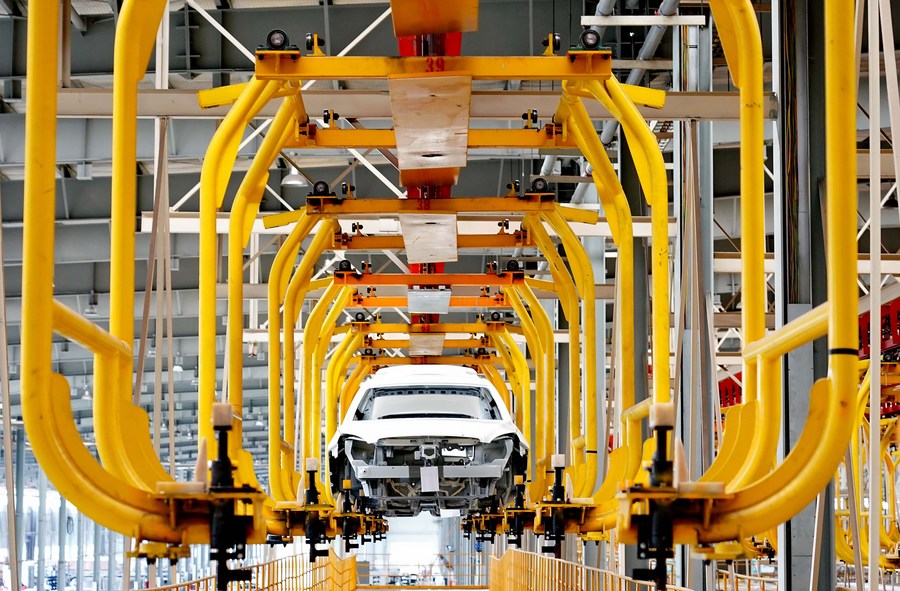A clean energy future will be much harder without China
- By Elliott Zaagman
 0 Comment(s)
0 Comment(s) Print
Print E-mail China Focus, November 23, 2020
E-mail China Focus, November 23, 2020

For the United States, a clean energy future will be much harder without China.
As China's relations with some of the world's largest economies have frayed in recent years, a number of countries have begun to question just how economically interconnected they would like to be with the PRC. This has been on display most prominently in China's relations with the United States, where a broad decoupling has been underway in recent years, affecting technology, trade, diplomatic ties, and more.
To re-evaluate their relationship with the world's second-biggest economy, those countries must weigh their priorities. For many of their leaders, their electoral mandates can be made far more difficult without China in the picture. This is perhaps most prominently evident in the space of clean energy and transportation, where the ambitions of lawmakers are high, but goals very difficult to achieve alone. Each step of the way, they will find that nearly impossible without enlisting the cooperation of Chinese firms, and inevitably the Chinese state as well. When it comes to the value chain of a clean energy future, most roads go through China.
This is perhaps most strikingly pronounced in the supply chain of lithium-ion (Li-Ion) batteries. The rechargeable batteries are becoming increasingly ubiquitous globally, as they represent what is the most cost-effective and efficient medium through which to store energy in a world shifting away from fossil fuels. While the average consumer may be most familiar with them from their smartphones and laptop computers, Li-Ion batteries are also used for electric vehicles, as well as providing the energy storage capacity for notoriously inconsistent wind and solar power.
At present, China holds a dominant position in Li-Ion manufacturing capacity. Yet while China serves as a manufacturing and assembly hub for many of the world's goods, what stands out, in this case, is that it also is the world leader in the raw material used to make Li-Ion batteries, and the refinement of that material as well. Indeed, China currently produces as much as 80 percent of the raw “rare earth” materials used in the batteries, somewhat of an anomaly for a country who has often had to depend on trade partners to meet its massive demand for resources.
It is in large part because of this advanced Li-Ion supply chain that Tesla has continued to go all-in on using China as one of its major hubs of operations. The American EV-maker has already begun exporting thousands of Model 3s from its brand-new Gigafactory near Shanghai, and there is a realistic possibility that we may soon see Teslas that are 100 percent made in China. While many American firms have begun to withdraw from China to avoid the risks of being in the middle of major geopolitical tensions, Elon Musk & co. seem to believe that involvement with China is essential.
China's NEV and Li-Ion success has come as a result of an industrial policy meant to spur domestic consumption of EVs, encouraging the rest of the supply chain to develop in order to meet consumer demand. In the country's numerous densely-populated megacities, simply acquiring a license plate or parking space can be prohibitively difficult. To incentivize ownership of EVs, many of China's largest and most prosperous cities offered designated license plates and parking spaces, as well as exemptions from some traffic restrictions.
Perhaps the heaviest thumb on the scale was the purchasing power of China itself. Mandates for cities to electrify their taxi and bus fleets created reliable demand for China's EV makers, accounting for nearly half of all the EV sales in the country in 2018.
As often occurs in the wake of Beijing's top-down pushes in economic and industrial policy, the process was imperfect as well. The frenzy that followed the government-backed incentives included numerous reports of subsidy fraud and an investment bubble that burst dramatically as monetary subsidies abruptly ended, leaving many startups to go broke.
Yet amidst the chaos, what has emerged for China is largely what its policymakers in Beijing were hoping for: A leading position in what is likely to be one of the most crucial strategic supply chains of the 21st century.
In recent years, the U.S. government has taken steps to reduce its dependence on China for rare earth minerals by increasing its domestic output, yet many argue that the steps taken will still not be enough to provide the U.S. with total rare earth self-sufficiency.
Even thus far, much of the progress the U.S. has made in electrifying its vehicle fleet has been accomplished with the involvement of China. Despite concerns over quality, many U.S. cities have chosen to cooperate with Shenzhen-based BYD's electric buses. BYD has also invested in expanding its capacity in the North American market, opening manufacturing plants in the U.S. and Canada.
The U.S. has produced a number of leading firms around the Li-Ion battery and EV space, but while leading research and development in the space has been strong for the U.S., China's supply chain capacity is proving to be unparalleled in its scale and capacity.
As the calls for a cleaner energy future grows, leaders will need to determine their priorities. They can move forward apart from China, but that path will likely be a slower and more difficult route, at least in the short term.






Go to Forum >>0 Comment(s)